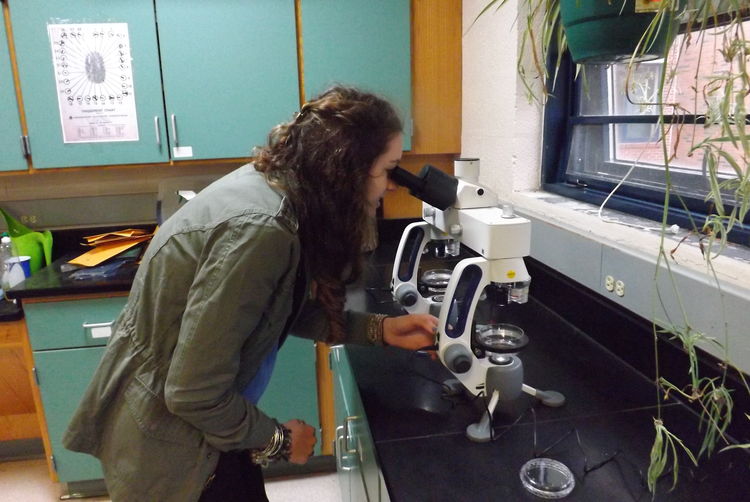STEM at School
Big on Biotech in Barnstable

“Biotech, Bio Wide” is the mantra of the biology teachers at Barnstable High school. Their goal is to engage students at all levels in hands-on biotechnology experiences—and they are succeeding.
Over the past two years, the school has added classes in forensics, pathology, and biotechnology. Teachers have organized external partnerships and encouraged student-driven projects. Student interest in science is booming. And in March, Barnstable was named the Innovative School of the Year by the Massachusetts Biotechnology Education Foundation.
When you go into the biotech classes at the school, you see some pretty amazing equipment—and students deep into using it.
Students in Valerie Lahetine’s pathology course, for example, peer through a high-powered binocular digital microscope at slides provided by the cytologist at Veterinary Associates of Cape Cod.
The high-resolution microscopes allow students to see and discuss the detailed characteristics of the specimens. As they work through their lab assignment, they are learning to observe differences in size, morphology, and motility, and to identify the telltale signs of diseased cells just as pathologists working in medical laboratories do.
Meanwhile, in Beth Anderson’s forensic science class, students explore the techniques that they see in popular TV crime shows. They’re using a specific comparison microscope, which combines two microscopes into one field of view, allowing for side-by-side comparison, to examine evidence from staged crime scenes.
Their experiments include examining bullets to determine through rifling patterns—tiny grooves and scratches—whether two bullets were fired from the same weapon. And they have compared hair samples, learning the techniques involved in determining which “suspect” was present at the scene of a crime.
The teachers are thrilled that the Cape Cod Regional STEM Network and the Barnstable Education Foundation made those microscope purchases possible. The Network's support came through our fall 2014 minigrant program.
But we all know great science classes are not just about having fancy equipment. Both teachers also invest a lot of time and effort focusing students on the big picture.
By reaching out into the community, Lahetine has been able to connect her coursework to the local ecosystem, designing a unit on plant pathology, for example, that investigates viruses that are infecting the Cape’s indigenous cranberry bogs.
Anderson points out that these experiences doing real scientific work help students “bring the science from the slide—and from the screen—into their own lives.”
She adds, “With each analysis, they are problem solving using what they see to make conclusions. We hope that this inspires them to pursue this work in the future, too.”